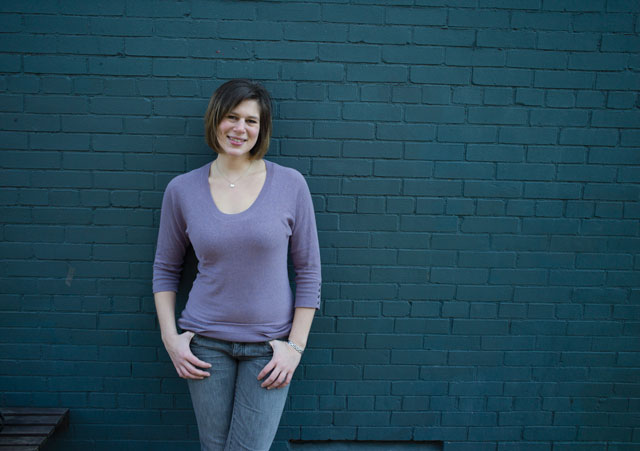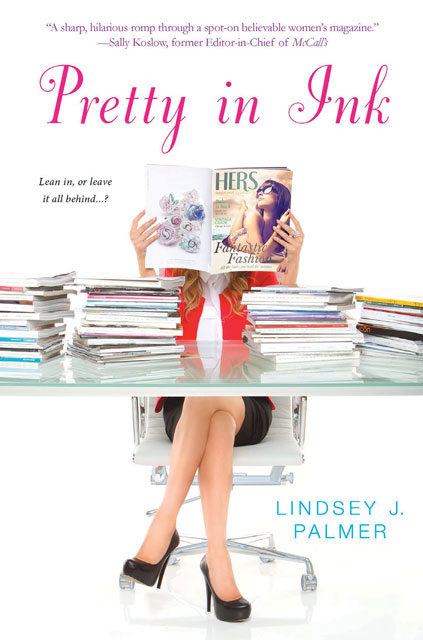From Masthead to Head of the Class

In 2011 Lindsey Palmer left her eight-year career in women’s magazine publishing to pursue a brand new career in education. In the final year, she wrote Pretty in Ink, a fictionalized tale of the anxieties, drama, and high-stakes world of recession-era consumer magazines. We sat down with the Park Slope native to discuss her big career transition and debut novel.
Park Slope Reader: How did you get into publishing?
Lindsey Palmer: Since I was little I always loved reading. That includes everything: books, magazines, anything I could get my hands on. And when I was in college I did a couple internships in book publishing. They were okay, but I felt they were a little too slow for me and making me not like to read books. They essentially gave me the slush pile, and so I found myself having to write rejection letter after rejection letter. I was like, you know what? I really want to keep books sacred, and so let me try magazines instead. The pace suited me better. I hit up my alumni network at Penn, and a senior editor at Glamour had gone to Penn and taken me under her wing. So I did that for eight years.
What was your trajectory?
I spent most of my years at Redbook, then at Self, and worked my way in the traditional way right up the masthead.
You decided at one point to leave—what prompted that decision?
As you can probably tell from the book, there’s a lot that I loved about the industry and a lot that I didn’t. And after a while, I just found that I wanted to try something new. As the recession raged on and there was competition from blogs and all sorts of free content online, my job became less about being an editor and more about being a brand manager. As you see from the characters in the book, there was more and more pressure for me to use my personal Facebook and Twitter accounts to promote every single thing we did at the magazine. It wasn’t why I got into it in the first place.
What motivated you to transition to education?
I’d always thought about teaching. The summer after college I taught writing at an arts camp in Vermont. I found that when I was twenty-one and my students were seventeen and eighteen, I was way too close in age and not mature enough to be a teacher. SoI thought, let’s put this on the back burner for a while.
It seemed like a way to work on the stuff I loved about magazines. I loved working with writers and helping them improve their story ideas. That was my idealized version of what it was like working with students. One of the other things I liked about working at magazines is that you reach such a large audience … but I didn’t know any of these people. When you are a teacher you have many fewer people you are reaching on any given day, but they are people you start to get to know. I felt like that was something that I wanted. I didn’t really know what I was in for.
Obviously they are two different worlds—Were there any major differences that made it difficult to adjust?
Yes! Any workplace, as you know, is its own world. And that’s what really motivated me to write this book. The place felt like its own character. This was such a crazy world to work in, and everyday I would think, What is going on here?!
Working in the New York City public school system is sort of the same, mammoth What is going on here?! Inherently I knew that working for a public institution would be different than working for a glitzy magazine. I never had to buy a toiletry in eight years! It was just always around—free food, free clothes, free coffee—I hardly went to stores at all.
And then you arrive at a public school. I had to buy my own paper to make my own photocopies. Now I feel what I am doing on a daily basis, though, is really challenging and I love it. No one goes into teaching for the glitz and glamor of it.
 When did you start writing Pretty in Ink?
When did you start writing Pretty in Ink?
I wrote it in 2011. It was the kind of thing that had been in the back of my head for a long time. By the time I finally sat down to write it, it went very quickly. I also wrote it when I knew I was leaving. I worried that if I spent so much time thinking through this world in a fictional way that I wouldn’t be able to see it freshly. It was sort of a farewell for me.
Each chapter of the book takes on the perspective of a single character on the masthead. Are these characters based on actual people you know, or are they archetypes?
There are definitely some real-life moments in there. Things certainly happened where I thought, This is too good to be true; I have to write this down! But they’re certainly not based on real people. I’ve always had very mixed feelings about this world, and each character funnels an attitude I had at one point. I think they are more archetypal. If you ask somebody to free associate with women’s magazines they will mention all these different kinds of attitudes.
Print magazines have been struggling the most in recent years. The “bottom line” puts a lot of pressure on everyone, and you build your story around this conflict. Do you see any hope, or will things only get more competitive in publishing?
That’s a good question … Here’s the thing: I don’t think print magazines will ever disappear. It’s such a unique experience to just sit there with a paper magazine. It’s different from reading something online, and it’s different than reading a book. There was a big push three or so years ago to move magazines to tablets. But it didn’t go anywhere because it’s really not the same experience as flipping through. I can’t see that disappearing entirely.
I think in the future, instead of twenty women’s magazines there will be five. Some will get weeded out. The most creative brands will find new ways to reach people. New magazines are still being launched. My very first boss at Redbook is now the editor-in-chief of Dr. Oz Magazine, which just came out last month, and they sold out every issue! There is still interest.
Has your approach to writing changed since leaving the industry?
In some ways writing for magazines was really helpful because you learn how to write on a deadline. If you have X amount of stories to write every week you just do it—you can’t be precious about it.
But when you write for the same brand, you start to internalize that voice because you have to. I did find it nice to get some distance and think, Okay, what’s my voice? I can have some more serious sections, and not everything has to end in a punch and a headline.
Also, now that I teach creative writing to high school students, it’s very interesting for me to go back to basics. How does a story arc work? How do you develop a character? How do you build dialogue? It’s very interesting to think about again, even if you’ve been doing it for a while.
What have you learned about yourself through this process?
I realized how much I like a challenge. It’s fun to switch things up and try something new. I think when you’re trying something new you have fresh eyes. Towards the end of working for magazines I began to feel a little like I was on autopilot. I feel like everyday in my classroom now—even though there are days when I feel like I am a total failure—it’s still interesting, and I can go home and think, What can I do differently tomorrow? There are still days when I wake up and think, What the hell have I done?! But that’s okay. It’s made me less scared to try something new.
While Pretty in Ink certainly highlights the drama of the magazine industry—even pokes fun at it—there is this undercurrent of love that comes through. You dedicated an entire novel to it, afterall. Do you miss it?
Yeah, I do. In 2008 I got to report on the Republican and Democratic National Conventions and hear Obama’s speech at Mile High Stadium. I got to be the person speaking to America. Working for a huge brand, you can tap into opportunities.
I also really miss everyone. Everyone—with very few exceptions—who works at magazines are incredibly creative and interesting people who have a lot going for them. I’m glad that you picked up on that because I was really trying to convey a mixed picture.
Catch Lindsey Palmer on April 15th at Housing Works Bookstore Cafe in Manhattan, and on April 21st at Symposia Bookstore in Hoboken, NJ.

Leave a Reply